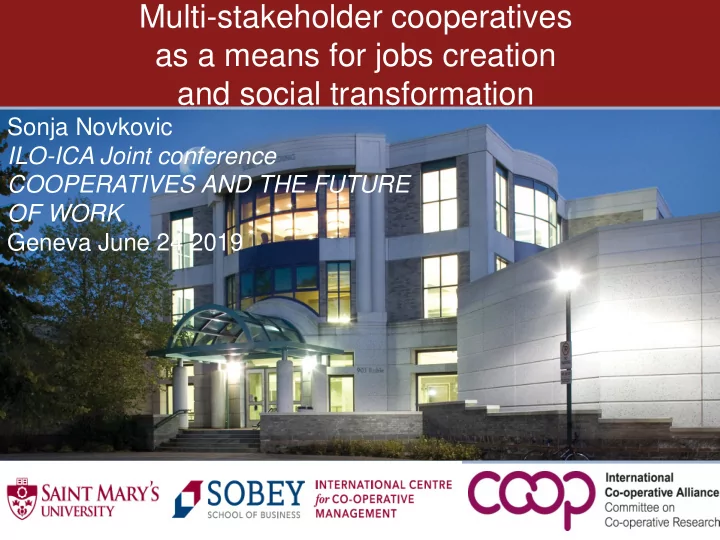

Multi-stakeholder cooperatives as a means for jobs creation and social transformation Sonja Novkovic ILO-ICA Joint conference COOPERATIVES AND THE FUTURE OF WORK Geneva June 24 2019
Motivation • Multistakeholder cooperative form is more prevalent than thought • Literature talks about MSCs as the ‘new’ cooperative form – Based on existence of legal frameworks for MSCs (Italy, Spain, France, Canada…) • Labour as the key factor in forming MSCs
Labour is the principal factor for transforming nature, society and human beings themselves . (Arizmendiarrieta, in Herrera 2004)
Multistakeholder governance • Multiple types of members who own and control the cooperative • Considered costly in economics literature (member heterogeneity) • In reality, complexity demands MS involvement and is more effective than unitary boards (homogeneity of purpose)
Inclusion of labour in MSC • MSC form often results from inclusion of labour in ownership and governance • But also labour (worker-members) expanding voice to other stakeholders, or • New MS ventures
Why MSC? • MSCs explicitly address the internalization of externalities into the mission of the cooperative enterprise – Moves away from the ‘ownership’ and investor focus to usership/impact and P7
MS advantages • MSC longevity, growth and endurance – the purpose is more cohesive than thought – multiple stakeholders engage through reciprocity and solidarity, rather than competing interests • Turnbull (2002) – multi-stakeholder network governance has competitive advantages, compared to unitary boards where access to information is limited
Transforming socio-economic relations • Transformative potential of MS governance • Advantages: – access to resources, diverse voices and concerns – Internalizing the ‘externalities’ – solidarity at the heart of social cooperatives, and in particular those who view labour as a vehicle for social transformation (or, a social asset) – motivates social innovation
Transformation requires attacking the root causes that generate and reproduce economic, social, political and environmental problems and inequities, not merely their symptoms Utting 2016
Thank you! snovkovic@smu.ca
Recommend
More recommend